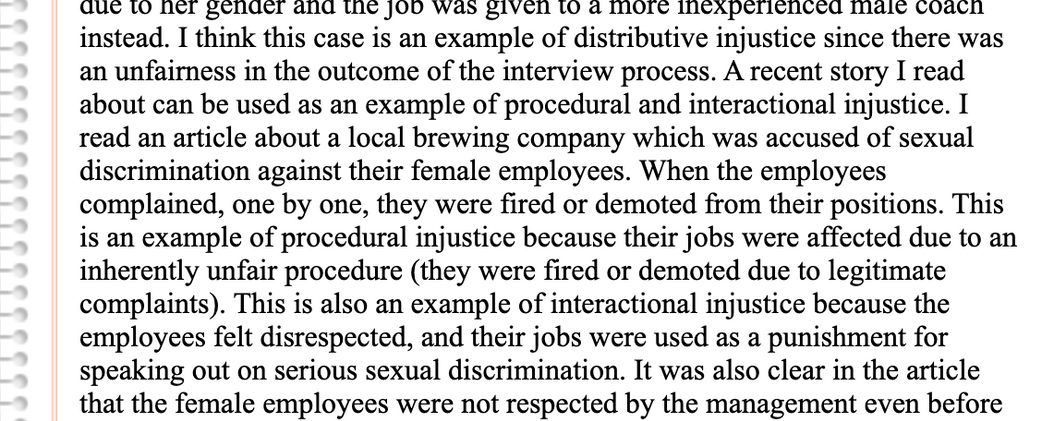Leadership
Psychology 303
Industrial/Organizational Psychology
Summer 2021
Course Description:
According to the Syllabus:
"I/O psychology involves the application of psychological concepts to work settings. This course is designed to familiarize you with the psychological theories and research related to issues of critical relevance to work, such as employee selection, training, motivation, organizational development, performance, leadership, well-being, and work-life balance. Understanding the various theories, processes, and roles within an organization should prove relevant and useful for anyone entering the workforce, regardless of profession or major."
The coursework in the class consisted of 6 weeks of quizzes and reflective journals in 14 different modules. An example of this coursework has been reproduced below (click images to enlarge).
These Modules included:
-
What is I-O Psychology?
-
Methods & Statistics in I-O Psychology
-
Individual Differences & Assessment
-
Job Analysis & Performance
-
Performance Measurement
-
Staffing Decisions
-
Training & Development
-
The Motivation to Work
-
Attitudes, Emotions, & Work
-
Stress & Worker Well-being
-
Fairness, Justice, & Diversity in the Workplace
-
Leadership in Organizations
-
Teams in Organizations
-
Organizational Theory, Dynamics, & Change
Example of work (click to enlarge):
Feel free to scroll through the examples of some of the work I accomplished through this six week course. The Journals pictured above were a part of the twice weekly homework assignments for this course. I felt these short writing assignments helped to apply the sometimes dense coursework into situations that helped students relate to the content. Some of the content seen in these assignments that relate directly to the concept of leadership include:
-
Hofstede’s model of cultural influence (Journal 1)
-
Constructive criticism and feedback (Journal 4)
-
Employment discrimination (Journal 6)
-
Job satisfaction (Journal 9)
-
Teamwork (Journal 13)
-
Organizational change (Journal 14)
Skills Learned:
-
Plan, Organize, and Prioritize Work
Because this course only ran for only 6 weeks during the summer, I had to prioritize the twice weekly homework assignments and quizzes. Organization and planning this work ahead of time was key in making sure I succeeded.
-
Decision-Making and Problem-Solving
In addition to making informed decisions during quizzes, this course emphasized decision making in such areas as staffing, performance measurement, team work, and job analysis.
-
Demonstrating Technical Knowledge
The technical knowledge I learned in this course included: The Five-Factor Model of Personality and other personality measures, types of administrative and cognitive tests, Campbell's model of job performance and other job performance tests, motivational theories including Maslow's hierarchy of needs and Vroom’s Valence Instrumentality Expectancy theory, the Demand/Control and Person-Environment Fit models of stress, forms of Affirmative Action programs, team-role theory, and Lewin’s 3-stage process of organizational change.
Looking Towards the Future:
I personally believe this LeADERS course was influential in the development of my career plan. Before taking this course, I was unsure about what field I wanted to enter and even what kind of work I was interested in. I always assumed I would end up with a generic office job. It wasn't until taking this course and learning about the different skills and knowledge involved in the Industrial/Organizational Psychology field that I even considered pursuing management, administration and human resources specifically. I have even thought about pursuing an advanced degree in I/O Psychology in the future, as I believe it could significantly benefit my career.















